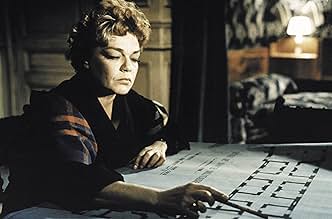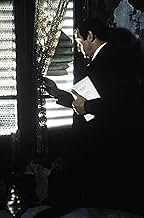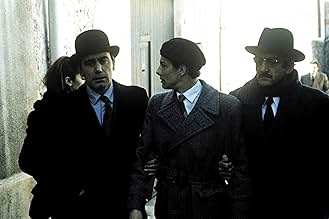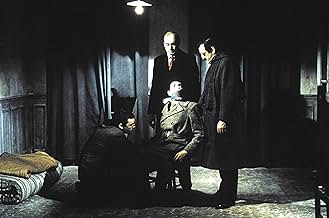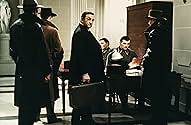IMDb रेटिंग
8.1/10
28 हज़ार
आपकी रेटिंग
अपनी भाषा में प्लॉट जोड़ेंAn account of underground resistance fighters in Nazi-occupied France.An account of underground resistance fighters in Nazi-occupied France.An account of underground resistance fighters in Nazi-occupied France.
- निर्देशक
- लेखक
- स्टार
- पुरस्कार
- 4 जीत और कुल 1 नामांकन
फ़ीचर्ड समीक्षाएं
This is a film about real heroes. Not the flashy Rambo kind, but ordinary men and women who did extraordinary things in a time when France had already surrendered to the Germans. They only numbered a few hundred at most, and they walked in the shadows around France knowing that they would certainly die before it was over. Yet, they moved on and did what they had to without complaint or regret.
You won't see bombs blazing and blood and gore. What you will see is real people who agonize over every death that they are forced to carry out. People who knew that every corner held danger and that they could be betrayed at any time.
These are real heroes and this film portrays them as they were in a somber, intelligent, and dark fashion. The film was made and released in 1969, yet it's awards are in 2006 and 2007, when it was restored and finally presented in this country.
As the films of Jean-Pierre Melville are made available, we are able to share in seeing one of the truly great directors in the world. The pleasure is immeasurable.
You won't see bombs blazing and blood and gore. What you will see is real people who agonize over every death that they are forced to carry out. People who knew that every corner held danger and that they could be betrayed at any time.
These are real heroes and this film portrays them as they were in a somber, intelligent, and dark fashion. The film was made and released in 1969, yet it's awards are in 2006 and 2007, when it was restored and finally presented in this country.
As the films of Jean-Pierre Melville are made available, we are able to share in seeing one of the truly great directors in the world. The pleasure is immeasurable.
"L'Armée des ombres" (1969) was shown in the U.S as "Army of Shadows." The film is co-written and directed by Jean-Pierre Melville.
The time is 1942 and the setting is France. Lino Ventura plays Philippe Gerbier, a high-ranking officer in the French resistance. Gerbier is intelligent, resourceful, and brave. He and his small band of urban fighters are constantly in danger of capture and torture by the Nazis. This isn't a film of rural partisans--it's a film where people meet in cafés and offices. No one knows when Nazi soldiers or Gestapo will sweep down and drag them off. No meeting is safe, and no relationship is safe either--how many people can remain silent under savage tortures that go on for days?
Although Ventura is excellent in the role, the movie is dominated by Simone Signoret as Mathilde--tougher and braver than any of the men, but possessing one terrible weakness.
This movie is different than most films about the French Resistance. Things don't go smoothly, they don't go well, fear is everywhere, and heroism often takes place in a prison cell where no one ever learns of it. It's fascinating, but grim.
"Army of Shadows" is a neglected film by a great director. It's definitely worth seeking out.
The time is 1942 and the setting is France. Lino Ventura plays Philippe Gerbier, a high-ranking officer in the French resistance. Gerbier is intelligent, resourceful, and brave. He and his small band of urban fighters are constantly in danger of capture and torture by the Nazis. This isn't a film of rural partisans--it's a film where people meet in cafés and offices. No one knows when Nazi soldiers or Gestapo will sweep down and drag them off. No meeting is safe, and no relationship is safe either--how many people can remain silent under savage tortures that go on for days?
Although Ventura is excellent in the role, the movie is dominated by Simone Signoret as Mathilde--tougher and braver than any of the men, but possessing one terrible weakness.
This movie is different than most films about the French Resistance. Things don't go smoothly, they don't go well, fear is everywhere, and heroism often takes place in a prison cell where no one ever learns of it. It's fascinating, but grim.
"Army of Shadows" is a neglected film by a great director. It's definitely worth seeking out.
Jean Pierre Melville, writer/director of Army of Shadows, has said in interviews that the book of which he based his movie from is considered THE book on the French resistance in the second world war. While I can only speculate as to this film being THE film of its category, as I've yet to see other films on the resistance, it sets quite a high standard for painting a very calculated, perfectly cool (or cold on your POV) piece of film-making on the subject.
It's basically as if Melville, having lived through the period- this being perhaps an even more personal film than his other crime films- still takes on some of the true knacks of what he does in the rest of his oeuvre. Taking characters who go by codes of loyalty, professional as can be, and in a true underground in society. However this time their opponent being the Germans instead of the police the stakes are raised. Even as a couple of parts in the middle seem to shake with the deliberate pace Melville sets a couple of times, the main core of the story and the characters is remarkable, and honest in a dark, bleak way.
Lino Ventura is at his best as Gerbier, a main man in the French resistance movement, who gets more involved in the proceedings following a brief prison-camp stint (the escape from which is one of the most daring in any film). The film is fairly episodic, however encompassing a group of the resistance people, including Mathilde (Simon Signet, very good as always), Le Masque (Claude Mann), and Jean-Francois (Jean-Pierre Cassel, at a peak as well in his own way).
Some of their operations are simple, like retrieving weapons or finding more support through certain channels. Though here and there some payback is in due to the traitors. This becomes a higher issue as the film rolls into its final act, as alliances come into question, and the real ties of humanity together are tested in the midst of the German occupation.
As usual with Melville all of this is told, in its own way, fairly simply- almost clinically- by Melville's camera. There are some zooms here and there, some very intense camera positions (though not awkwardly), and exciting when need be. At the same time, there are some scenes like a short scene on a beach (all blue) or a few others at night or in different lighting modes that are the best Melville's done in the midst of a color scheme used perfectly to correspond with the mood; it works just as well if not better than how he uses it for his crime films.
But one of the pleasures of seeing a film like this by a real kind of maverick of European cinema is seeing how much room he gives for his actors. These are not performances that become over-sensational in the slightest. On the contrary, what adds sometimes to the tension in some of the scenes, or the outright tragedy, is how the actors just play as they do professional-wise, sometimes with what's not said meaning more (and how the Melville gets these quiet moments is fantastic). Featuring a superlative musical accompaniment by Eric De Marsan, this is one of the best directed anti-war films ever made.
It's basically as if Melville, having lived through the period- this being perhaps an even more personal film than his other crime films- still takes on some of the true knacks of what he does in the rest of his oeuvre. Taking characters who go by codes of loyalty, professional as can be, and in a true underground in society. However this time their opponent being the Germans instead of the police the stakes are raised. Even as a couple of parts in the middle seem to shake with the deliberate pace Melville sets a couple of times, the main core of the story and the characters is remarkable, and honest in a dark, bleak way.
Lino Ventura is at his best as Gerbier, a main man in the French resistance movement, who gets more involved in the proceedings following a brief prison-camp stint (the escape from which is one of the most daring in any film). The film is fairly episodic, however encompassing a group of the resistance people, including Mathilde (Simon Signet, very good as always), Le Masque (Claude Mann), and Jean-Francois (Jean-Pierre Cassel, at a peak as well in his own way).
Some of their operations are simple, like retrieving weapons or finding more support through certain channels. Though here and there some payback is in due to the traitors. This becomes a higher issue as the film rolls into its final act, as alliances come into question, and the real ties of humanity together are tested in the midst of the German occupation.
As usual with Melville all of this is told, in its own way, fairly simply- almost clinically- by Melville's camera. There are some zooms here and there, some very intense camera positions (though not awkwardly), and exciting when need be. At the same time, there are some scenes like a short scene on a beach (all blue) or a few others at night or in different lighting modes that are the best Melville's done in the midst of a color scheme used perfectly to correspond with the mood; it works just as well if not better than how he uses it for his crime films.
But one of the pleasures of seeing a film like this by a real kind of maverick of European cinema is seeing how much room he gives for his actors. These are not performances that become over-sensational in the slightest. On the contrary, what adds sometimes to the tension in some of the scenes, or the outright tragedy, is how the actors just play as they do professional-wise, sometimes with what's not said meaning more (and how the Melville gets these quiet moments is fantastic). Featuring a superlative musical accompaniment by Eric De Marsan, this is one of the best directed anti-war films ever made.
This is a tough, somber film that captures the absurdities involved in war, and, ultimately, in life. The French Resistance "heroes" in the story are never shown conducting sabotage or planned attacks against the Germans, as one would get in a traditional World War II movie. Instead, we follow their claustrophobic and paranoid lives as they move from one hiding place to another (or one prison to another), constantly hounded by those in power, haunted by their own actions and the inability to communicate with those dear to them. Melville shows us their doubts and questions as they deal with betrayal, cowardice, and the murky ethics of killing their own to preserve the larger good.
Every episode in the film seems to lead to a darkly ironic conclusion, and the meaninglessness of their efforts becomes almost overwhelming, except that, somehow, these ordinary people continue to offer resistance in the face of death, so that their heroism lies not in the ability to stop the Germans but in taking action at all while facing the abyss.
While the acting is excellent all around, Lino Ventura's performance as Gerbier deserves special attention. It's hard to imagine any other actor bearing the tremendous weight of this film as well as he does. Gabin, at an earlier age, might have had the physical and emotional strength, but I'm not sure he would've been capable of Ventura's unassuming portrayal, which is so necessary for his character. The "shadows" at the core of this tale are seriously dark, and Ventura's Gerbier is strong enough to face them, yet modest enough to realize he can't conquer them on his own. The only way the Resistance makes sense by the end of this film, is in the collective effort of its members. Similarly, each of us, individually, cannot conquer death, but we as a group of human beings can continue to live on. _L'Armée des ombres_ ultimately moves beyond a story of the French Resistance in World War II and serves as a powerful existentialist epic, with Ventura's performance responsible for much of the film's dignity and humanity.
As with _Léon Morin, prêtre_ (1961), another story set during the war, Melville seems more emotionally present in _L'Armée des ombres_ than he does in his policiers or noir pieces, and after seeing the film, his overall body of work suddenly seems much heftier. While the movie isn't as visually daring of some of his other works, it has a dark beauty all its own, and his pacing, editing, shot selection, and use of sound show him in great artistic control. Forty-eight hours after seeing it, I still find myself caught in its world.
Every episode in the film seems to lead to a darkly ironic conclusion, and the meaninglessness of their efforts becomes almost overwhelming, except that, somehow, these ordinary people continue to offer resistance in the face of death, so that their heroism lies not in the ability to stop the Germans but in taking action at all while facing the abyss.
While the acting is excellent all around, Lino Ventura's performance as Gerbier deserves special attention. It's hard to imagine any other actor bearing the tremendous weight of this film as well as he does. Gabin, at an earlier age, might have had the physical and emotional strength, but I'm not sure he would've been capable of Ventura's unassuming portrayal, which is so necessary for his character. The "shadows" at the core of this tale are seriously dark, and Ventura's Gerbier is strong enough to face them, yet modest enough to realize he can't conquer them on his own. The only way the Resistance makes sense by the end of this film, is in the collective effort of its members. Similarly, each of us, individually, cannot conquer death, but we as a group of human beings can continue to live on. _L'Armée des ombres_ ultimately moves beyond a story of the French Resistance in World War II and serves as a powerful existentialist epic, with Ventura's performance responsible for much of the film's dignity and humanity.
As with _Léon Morin, prêtre_ (1961), another story set during the war, Melville seems more emotionally present in _L'Armée des ombres_ than he does in his policiers or noir pieces, and after seeing the film, his overall body of work suddenly seems much heftier. While the movie isn't as visually daring of some of his other works, it has a dark beauty all its own, and his pacing, editing, shot selection, and use of sound show him in great artistic control. Forty-eight hours after seeing it, I still find myself caught in its world.
ARMY IN THE SHADOWS (Jean-Pierre Melville - France/Italy 1969).
Jean-Pierre Melville's work features basically two themes: the world of crime and the French resistance. In Melville's eyes, these two worlds are very much the same. The gangster codes he adopted for many of his films were based largely on the codes of the French resistance and his own experiences during the German occupation (not the other way round as some people suggested).
Melville must be the most celebrated French director at this point in the U.S, after the re-release of "Army in the Shadows" in 2006, that was almost universally applauded by the critics as a work of genius or a forgotten masterpiece. Now, in many ways this is a good film, but something is missing, and I can't really put my finger on it. Perhaps it's the clinically almost surreal interaction between the characters, that worked so well in Melvile's gangsters film, but here he is depicting (admittedly his own ) reality and very much his personal take on French resistance, where "real life" plays a much greater part than in the surreal settings of many of his gangster films, but it doesn't feel that way when watching this. The film is languidly paced with a slow build-up, but never really catches fire. With Melville's characteristically cold - almost clinical - direction, it's partly captivating in parts, but perhaps the tone is a little too detached for my taste. He certainly takes his time to tell the story, but the acting is first class with Lino Ventura and Simone Signouret giving memorable performances among a first-rate cast.
Camera Obscura --- 7/10
Jean-Pierre Melville's work features basically two themes: the world of crime and the French resistance. In Melville's eyes, these two worlds are very much the same. The gangster codes he adopted for many of his films were based largely on the codes of the French resistance and his own experiences during the German occupation (not the other way round as some people suggested).
Melville must be the most celebrated French director at this point in the U.S, after the re-release of "Army in the Shadows" in 2006, that was almost universally applauded by the critics as a work of genius or a forgotten masterpiece. Now, in many ways this is a good film, but something is missing, and I can't really put my finger on it. Perhaps it's the clinically almost surreal interaction between the characters, that worked so well in Melvile's gangsters film, but here he is depicting (admittedly his own ) reality and very much his personal take on French resistance, where "real life" plays a much greater part than in the surreal settings of many of his gangster films, but it doesn't feel that way when watching this. The film is languidly paced with a slow build-up, but never really catches fire. With Melville's characteristically cold - almost clinical - direction, it's partly captivating in parts, but perhaps the tone is a little too detached for my taste. He certainly takes his time to tell the story, but the acting is first class with Lino Ventura and Simone Signouret giving memorable performances among a first-rate cast.
Camera Obscura --- 7/10
क्या आपको पता है
- ट्रिवियाCinematographer Pierre Lhomme claimed that the last surviving, watchable print of the movie had turned completely pink with age. He later supervised the 2k resolution, digital restoration of the film at the Eclair Laboratories in Paris.
- गूफ़In the London WWII sequence, double yellow lines are visible on the road. These were only introduced in the UK in 1956 and didn't become common until the 1960s; a few of the street signs have a style not known before the 1960s.
- भाव
Philippe Gerbier: See you, Comrade.
Legrain: You a communist?
Philippe Gerbier: No. But I do have comrades.
- कनेक्शनFeatured in Mémoires pour Simone (1986)
टॉप पसंद
रेटिंग देने के लिए साइन-इन करें और वैयक्तिकृत सुझावों के लिए वॉचलिस्ट करें
विवरण
- रिलीज़ की तारीख़
- कंट्री ऑफ़ ओरिजिन
- भाषाएं
- इस रूप में भी जाना जाता है
- Army of Shadows
- फ़िल्माने की जगहें
- Bunker de l'armée, Saint-Cyr-l'Ecole, Yvelines, फ़्रांस(execution by the Gestapo)
- उत्पादन कंपनियां
- IMDbPro पर और कंपनी क्रेडिट देखें
बॉक्स ऑफ़िस
- US और कनाडा में सकल
- $8,61,983
- US और कनाडा में पहले सप्ताह में कुल कमाई
- $12,620
- 30 अप्रैल 2006
- दुनिया भर में सकल
- $9,31,732
इस पेज में योगदान दें
किसी बदलाव का सुझाव दें या अनुपलब्ध कॉन्टेंट जोड़ें






